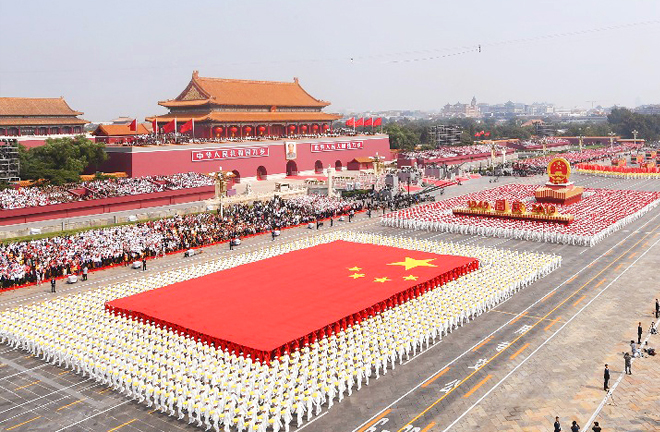China celebrates 70th National Day

Formations featuring a giant national flag and the emblem of the PRC take part in mass pageantry celebrating the 70th anniversary of the PRC’s founding in Beijing, Oct. 1 Photo: Zhai Jianlan/XINHUA
A grand celebration, followed by a military parade and mass pageantry, took place at Tian’anmen Square in Beijing on Oct. 1, National Day, to mark the 70th anniversary of the founding of the People’s Republic of China (PRC).
Chinese President Xi Jinping, also general secretary of the Communist Party of China (CPC) Central Committee and chairman of the Central Military Commission, delivered an important speech at the grand gathering.
“Seventy years ago on this day, Comrade Mao Zedong solemnly declared here to the world that the PRC was founded and the Chinese people had stood up,” Xi said.
The founding of the PRC completely changed China’s miserable fate of being poor and weak and being bullied and humiliated in over 100 years since the advent of modern times, Xi said. The Chinese nation has since then embarked on the path of realizing national rejuvenation, he said.
Wang Cungang, associate dean of the Institute of China Strategy at Tongji University, said that the PRC’s founding is the biggest milestone in the history of Chinese politics in the 20th century and one of the major events with global influence in the history of world politics in the 20th century. It can be said that the establishment of the PRC has brought about major or fundamental changes in China’s internal affairs and diplomacy, laying a solid foundation for the Chinese nation to embark on a journey of great rejuvenation.
Lu Yilong, a professor from the School of Sociology and Population Studies at Renmin University of China, said that after the PRC was founded, China gradually established an independent and relatively complete national industrial system, laying a material foundation for its prosperity.
Yao Shujie, a professor from the School of Economics and Business Administration at Chongqing University, said that in 1950, China’s GDP was about 4.6% of the world’s total. After 70 years of socialist construction, in particular after the rapid economic growth of more than four decades since reform and opening up, China’s GDP now accounts for about 16% of the world’s total, turning into the world’s thriving second largest economy.
China has made impressive achievements in poverty alleviation and infrastructure construction in rural areas. For example, Lu said that the current poverty headcount ratio is less than 4%. China’s anti-poverty and poverty alleviation efforts have made great contributions to global poverty relief.
Speaking of the potential for and advantages in future development, Yao noted that China has a vast territory, a tremendous market, a complete industrial system, strong human capital, political stability and policy consistency, and industrious people, which are all unique advantages for its socialist construction.
Zhang Xingxing, a research fellow from the Institute of Contemporary China Studies at the Chinese Academy of Social Sciences, suggested that the development of the PRC should be based on Chinese history, Chinese society and Chinese culture, and it should be studied and examined in the great process of Chinese national liberation and revival, so that the laws governing the development of the PRC can be firmly grasped.
edited by JIANG HONG

 PRINT
PRINT CLOSE
CLOSE